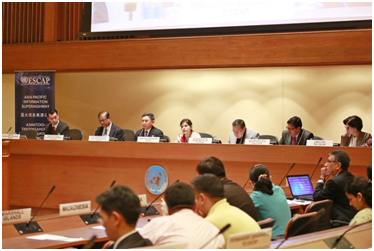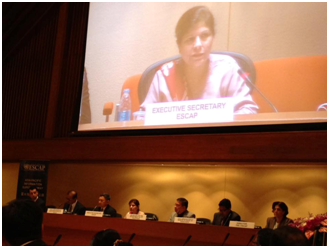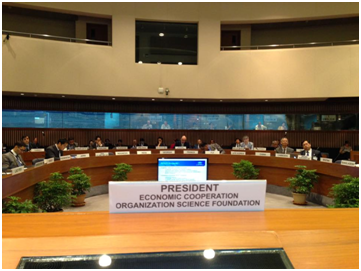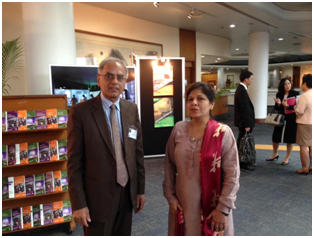UN Economic and Social Commission for Asia and the Pacific (UNESCAP) held the Inaugural Meeting of its Committee on IT and STI to achieve UN 2030 Agenda for Sustainable Development, October 5-7 2016 at UNCC, Bangkok-Thailand
Go Back

President ECO Science Foundation as Invited Speaker shared ECOSF's STI Initiatives and Plans
 The United Nations Economic and Social Commission for Asia and the Pacific (UNESCAP) Committee on Information and Communications Technology (ICT), and Science, Technology & Innovation (STI)” was held at the UN Convention Centre (UNCC) in Bangkok, Thailand during October 5-7 2016, with a focus on how best to use these powerful tools to achieve the transformative UN 2030 Agenda for Sustainable Development.
The United Nations Economic and Social Commission for Asia and the Pacific (UNESCAP) Committee on Information and Communications Technology (ICT), and Science, Technology & Innovation (STI)” was held at the UN Convention Centre (UNCC) in Bangkok, Thailand during October 5-7 2016, with a focus on how best to use these powerful tools to achieve the transformative UN 2030 Agenda for Sustainable Development.
United Nations Under Secretary General and Executive Secretary of ESCAP Dr. Shamshad Akhtar opened the session on 5th October 2016. In her opening remarks she said, “As the world embarks on its journey towards the implementation of Sustainable Development Goals, scientific breakthroughs, technological advances and innovative ideas continue at a rapid pace – many of these breakthroughs occurring in this region. Although the Asia-Pacific region has some of the most innovative and technologically advanced economies in the world, it is also home to some of the most technologically deprived. The role of ICT and STI as an engine of economic growth and a valuable source of innovation is irrefutable but contingent on how South-South collaboration can harness ICT and STI advances for the poor,” she added.
 H.E. Air Chief Marshal (R) Prajin Juntong, Deputy Prime Minister and Acting Minister of Digital Economy and Society, Thailand inaugurated the session and highlighted the importance of a progressive ICT and STI agenda. ICT and STI serves as an engine of economic growth and sustainable development,” he mentioned.
H.E. Air Chief Marshal (R) Prajin Juntong, Deputy Prime Minister and Acting Minister of Digital Economy and Society, Thailand inaugurated the session and highlighted the importance of a progressive ICT and STI agenda. ICT and STI serves as an engine of economic growth and sustainable development,” he mentioned.
The panelists in panel discussion on STI moderated by Dr. Shamshad Akhtar included high level dignitaries including Dr. Zakri Abdul Hamid, Adviser Science to PM of Malaysia, Minister of Science, Technology and Research of Thailand H. E. Dr. Pichet Durongkaveroj, Ms. Lisa Rauter from Australia, Prof. Srimali Farnando Chair of National Science Foundation of Sri Lanka and Prof. Apiwat from Chulong University of Thailand.
President ECO Science Foundation (ECOSF) Prof. Dr. Manzoor Hussain Soomro was invited speaker in 1st Meeting of the UN ESCAP Committee on ICT/STI. During the panel discussion. Dr. Soomro stressed upon the importance of investing in Children via Inquiry Based Science Education (IBSE) and Capacity Building of Teachers as well as investing in STI research in the developing world. This requires political will and harmonization of STI-ICT policies of member countries of ESCAP as well as ECO.
 President ECOSF made a presentation entitled; “ECO Science Foundation for Science, Technology & Innovation based Economic Development in the ECO Region”. He introduced ECO Science Foundation, its aims & objectives, activities, programmes as well as strategic steps and partners. Dr. Soomro in his presentation stressed upon the role of youth in attaining sustainable development. He focused on Digital solutions to overcome youth unemployment “Equipping young people with digital skills will open doors to a range of jobs and business opportunities” he added.
President ECOSF made a presentation entitled; “ECO Science Foundation for Science, Technology & Innovation based Economic Development in the ECO Region”. He introduced ECO Science Foundation, its aims & objectives, activities, programmes as well as strategic steps and partners. Dr. Soomro in his presentation stressed upon the role of youth in attaining sustainable development. He focused on Digital solutions to overcome youth unemployment “Equipping young people with digital skills will open doors to a range of jobs and business opportunities” he added.
President ECOSF also shared the ECOSF Initiatives on UN SDGs 2030: The “AppIdea2R” Contest. It has been designed by ECOSF for empowering and mobilising youth and accelerating the implementation of sustainable solutions in the community at national and international levels. The Contest aims to promote development of software applications on SDGs related to one or more of the Sustainable Development Goals for web, personal computer, mobile handheld device, console, SMS, or any software platform broadly available to the public. The App submitted in the Contest should address at least one of the 17 SDGs, either for Awareness creation OR Contribute to progress towards meeting the SDGs. It will be an open opportunity for university students of the 10 ECO countries; Afghanistan, Azerbaijan, Iran, Kazakhstan, Kyrgyzstan, Pakistan, Tajikistan, Turkey, Turkmenistan and Uzbekistan to become part of an international team to solve the social problems as well as win prizes.
Other two presentations were made by the APEC- Asia-Pacific Economic Cooperation, Program Director Bernard Li and Mr. Alexander Lozin of Eurasian Economic Commission (ECC). The idea of Sub-regional Organisation like ECO/ECOSF, APEC and ECC was to benefit from the experiences of these and more sub-regional organisations.

On the sidelines of the meeting, President ECOSF had a brief meeting with the ESCAP Executive Secretary Dr. Shamshad Akhtar and discussed mutual interests and possibilities of closer cooperation in STI and IT in the ECO Region.
After the three days of consultative exercises among the senior government representatives from more than 35 Asia-Pacific countries, an overwhelming support to develop seamless regional connectivity to increase the availability, reliability and affordability of broadband Internet for all to attain sustainable development in the Asia-Pacific region, was called for. Master Plan of ESCAP in this regard was endorsed and Regional Cooperation Framework Document for the Asia-Pacific Information Superhighway which aims to establish and strengthen a regional network between land and undersea-based ICT infrastructure was recommended. These plans and documents will be presented in the next regular session of UNESCAP for approval. STI is a new domain of ECSAP for economic and social uplift of the region.
Countries in the region additionally recognized the need to develop STI policy priorities and focus areas to effectively harness its potential towards achieving the Sustainable Development Goals (SDGs). The Committee highlighted the importance of ensuring that those most vulnerable are not left behind in the region’s innovation and technology revolution.
“Through this Committee we have built a solid foundation from which we as a region can harness science, technology and innovation to together meet the ambitions of the SDGs,” said United Nations Under-Secretary-General and Executive Secretary of ESCAP Dr. Shamshad Akhtar in her closing remarks at the Committee.
Dr. Akhtar added, “ICT and STI are transforming our society on a daily basis. We must be ready to utilize them to solve our development challenges and enable our societies to prosper. ICT and STI can be the engine for future growth and a driver of regional cooperation.”
It is expected that ECOSF would be engaged in future STI-ICT endeavors and activities of UNESCAP.